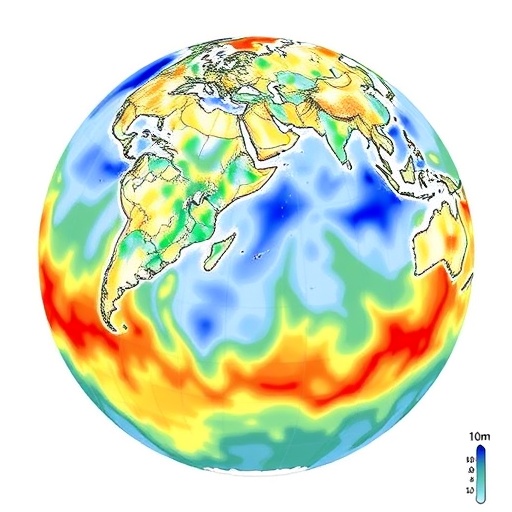Recent research published in “Communications Earth and Environment” offers groundbreaking insights into the palaeoecological changes that unfold in high-latitude regions, particularly within the south-west Pacific Ocean, preceding one of the Earth’s most significant climatic events, the Palaeocene-Eocene Thermal Maximum (PETM). The study emphasizes that these crucial ecological transitions began a remarkable 200,000 years before the onset of the PETM, suggesting a deeper and more intricate web of biological and environmental interrelations than previously understood.
The Palaeocene-Eocene Thermal Maximum, marked by a dramatic spike in global temperatures and significant shifts in biodiversity, holds a pivotal place in Earth’s history. Characterized by rapid climate change, this period has often been analyzed from a strictly atmospheric or geological standpoint. The research spearheaded by a team of dedicated scientists delves deeper into the ecological responses to such intense climatic pressures and their chronology, revealing how ecosystems reacted long before the drastic changes in climate took center stage.
Central to this study are high latitude marine ecosystems that play a critical role in global biogeochemical cycles. The researchers employed extensive data collection, utilizing deep-sea sediment cores that preserve a detailed temporal record. These sediment cores enable scientists to reconstruct past biological communities and their shifts over geological time scales. Through these methods, the team could identify specific changes in species composition and abundance that hinted at an ecological precursor to the PETM.
The findings have substantial implications for our understanding of climate change’s effects on marine life. The initial stages of ecosystem disruption were characterized by a marked loss of certain taxa that struggle in fluctuating climates, setting the stage for new assemblage structures to emerge. This layering of biological responses not only illustrates the resilience and adaptability of marine organisms but also serves as a cautionary tale for current oceanic systems facing unprecedented changes.
Moreover, the study reveals the interconnectedness of climate factors that lead to ecological shifts. It becomes evident that atmospheric increases in greenhouse gases, alongside changes in ocean currents and temperatures, serve as catalysts for these profound shifts. Such revelations highlight the multifaceted nature of climate impact—an intricate balance where minor changes in atmospheric composition can trigger significant biological consequences.
Understanding these ancient patterns offers crucial insights into current environmental challenges. As present-day oceans continue to warm, learning from the past can inform predictions about future biodiversity losses and ecosystem transformations. The lessons from the PETM emphasize the potential for sudden ecological regime shifts, underscoring the urgent need for proactive measures in conservation and climate action.
What makes this research particularly intriguing is not just the timeline established, but also the methodologies employed. Advanced analytical techniques, including isotope geochemistry and fossil content analysis, are critical in extracting and deciphering the complex narratives written in the Earth’s layers. Such pioneering approaches set a precedent for future palaeoecological research, potentially guiding similar studies to uncover other significant climatic events.
Key to the study’s integrity is the collaborative effort among a team of skilled scientists. Their diverse expertise ranges from paleontology and marine biology to climatology, allowing for a holistic approach to understanding the intricate tapestries of life that occurred during past geological epochs. This collaborative spirit is a testament to the importance of interdisciplinary research in tackling complex scientific questions, which often do not confine themselves to single research domains.
Furthermore, this research contributes to an ongoing discourse about the resilience of ecosystems in the face of rapid change. While the study highlights how prior ecosystems responded to ancient warming events, it also invites reflection on contemporary ecological dynamics. The parallels drawn between past events and current climatic conditions evoke a sense of urgency, emphasizing the importance of safeguarding biodiversity as we face the challenges of our time.
As we gaze upon the future, the echoes of the past resonate louder now than ever. The lessons learned from the examination of the high latitude south-west Pacific Ocean bear critical significance, not merely for understanding historical climate events but for shaping the trajectory of our present and future management of marine systems. The study encourages both scientists and policymakers to take heed of ancient environmental changes as we strive to navigate the precarious waters of climate stewardship.
To sum up, the research offers a profound exploration into how palaeoecological transitions preceded the PETM, providing essential context as we grapple with our current climate crisis. By unraveling these connections, we gain valuable insight into the potential responses of marine ecosystems to ongoing and future climatic shifts, equipping us with the knowledge necessary to implement informed strategies for environmental conservation and sustainability. As we reflect on Earth’s climatic history and its impacts on biological life, we are reminded of our responsibility to preserve the delicate balance that sustains these ecosystems.
In conclusion, this monumental research work not only sheds light on a significant and often overlooked aspect of the PETM but also stands as a crucial reference point for contemporary discussions around climate change and ecological resilience. It serves as a stark reminder that our knowledge of past events is instrumental in predicting and mitigating the future impacts of climate shifts on global ecosystems.
Subject of Research: Palaeoecological changes preceding the Palaeocene-Eocene Thermal Maximum.
Article Title: Palaeoecological change preceded the Palaeocene-Eocene Thermal Maximum by 200 kyr in the high latitude south-west Pacific Ocean.
Article References:
Jones, H.L., Niederbockstruck, B., Westerhold, T. et al. Palaeoecological change preceded the Palaeocene-Eocene Thermal Maximum by 200 kyr in the high latitude south-west Pacific Ocean.
Commun Earth Environ 6, 746 (2025). https://doi.org/10.1038/s43247-025-02749-5
Image Credits: AI Generated
DOI:
Keywords: Palaeoecology, Palaeocene-Eocene Thermal Maximum, marine ecosystems, climate change, biodiversity.




